Legal Basis of Separate Identity of Companies: A Corporate Law Essay
VerifiedAdded on 2020/03/16
|6
|1848
|37
Essay
AI Summary
This essay delves into the legal basis of the separate identity of companies, a fundamental principle in corporate law. It explores the landmark case of Salomon v A Salomon & Co Ltd, which established the doctrine of separate legal personality, and its subsequent incorporation into the Corporations Act 2001 (Cth) in Australia. The essay provides a detailed analysis of the Salomon case, explaining how the court's decision affirmed the distinction between a company and its members, leading to limited liability for shareholders. It discusses the evolution of this doctrine through cases like Lee v Lee's Air Farming Limited and Macaura v Northern Assurance Co, as well as the concept of the corporate veil. The essay also examines the future of company law, including instances where the corporate veil may be pierced, and concludes that the principle established in Salomon's case remains a cornerstone of company law, although there are limited exceptions in cases of fraud, sham, or facade.
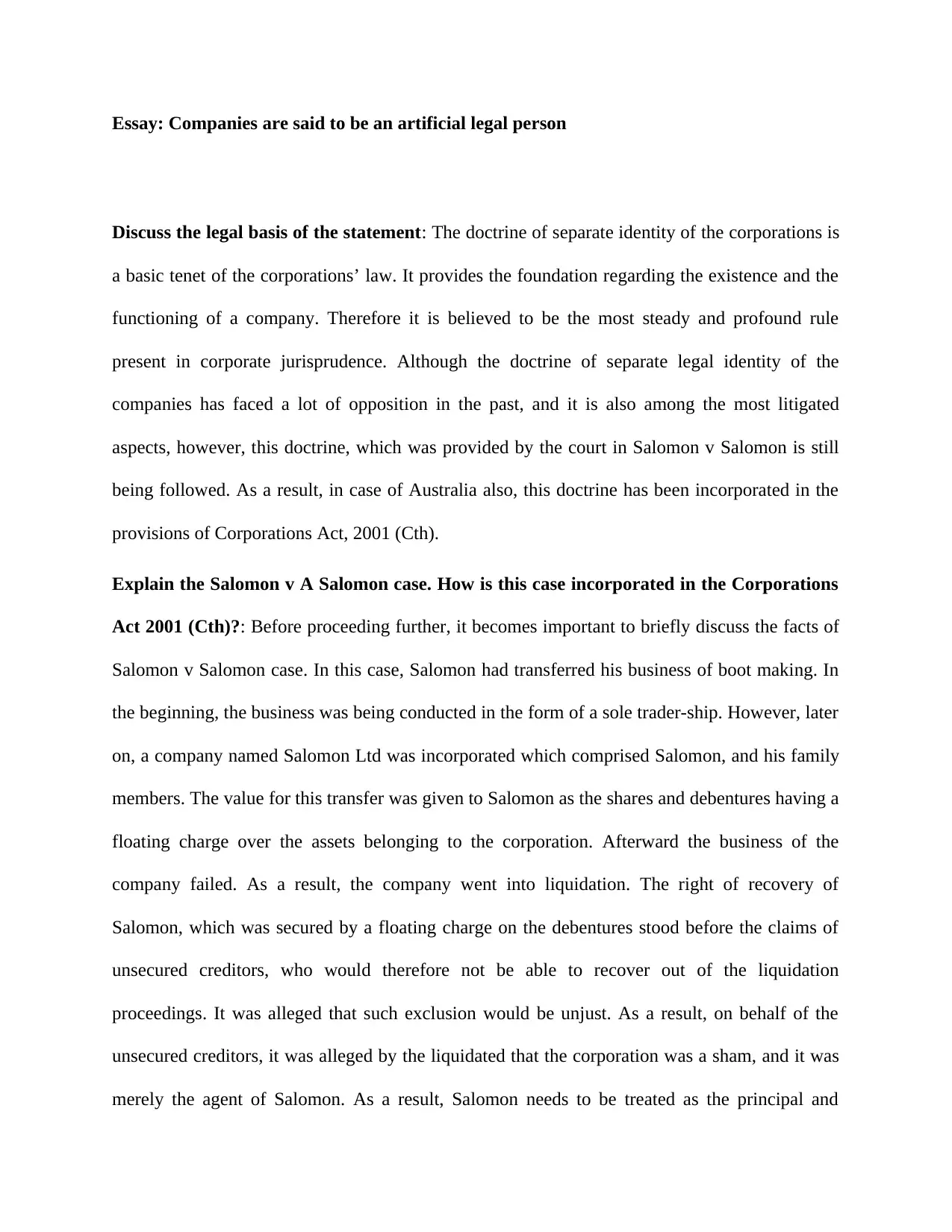
Essay: Companies are said to be an artificial legal person
Discuss the legal basis of the statement: The doctrine of separate identity of the corporations is
a basic tenet of the corporations’ law. It provides the foundation regarding the existence and the
functioning of a company. Therefore it is believed to be the most steady and profound rule
present in corporate jurisprudence. Although the doctrine of separate legal identity of the
companies has faced a lot of opposition in the past, and it is also among the most litigated
aspects, however, this doctrine, which was provided by the court in Salomon v Salomon is still
being followed. As a result, in case of Australia also, this doctrine has been incorporated in the
provisions of Corporations Act, 2001 (Cth).
Explain the Salomon v A Salomon case. How is this case incorporated in the Corporations
Act 2001 (Cth)?: Before proceeding further, it becomes important to briefly discuss the facts of
Salomon v Salomon case. In this case, Salomon had transferred his business of boot making. In
the beginning, the business was being conducted in the form of a sole trader-ship. However, later
on, a company named Salomon Ltd was incorporated which comprised Salomon, and his family
members. The value for this transfer was given to Salomon as the shares and debentures having a
floating charge over the assets belonging to the corporation. Afterward the business of the
company failed. As a result, the company went into liquidation. The right of recovery of
Salomon, which was secured by a floating charge on the debentures stood before the claims of
unsecured creditors, who would therefore not be able to recover out of the liquidation
proceedings. It was alleged that such exclusion would be unjust. As a result, on behalf of the
unsecured creditors, it was alleged by the liquidated that the corporation was a sham, and it was
merely the agent of Salomon. As a result, Salomon needs to be treated as the principal and
Discuss the legal basis of the statement: The doctrine of separate identity of the corporations is
a basic tenet of the corporations’ law. It provides the foundation regarding the existence and the
functioning of a company. Therefore it is believed to be the most steady and profound rule
present in corporate jurisprudence. Although the doctrine of separate legal identity of the
companies has faced a lot of opposition in the past, and it is also among the most litigated
aspects, however, this doctrine, which was provided by the court in Salomon v Salomon is still
being followed. As a result, in case of Australia also, this doctrine has been incorporated in the
provisions of Corporations Act, 2001 (Cth).
Explain the Salomon v A Salomon case. How is this case incorporated in the Corporations
Act 2001 (Cth)?: Before proceeding further, it becomes important to briefly discuss the facts of
Salomon v Salomon case. In this case, Salomon had transferred his business of boot making. In
the beginning, the business was being conducted in the form of a sole trader-ship. However, later
on, a company named Salomon Ltd was incorporated which comprised Salomon, and his family
members. The value for this transfer was given to Salomon as the shares and debentures having a
floating charge over the assets belonging to the corporation. Afterward the business of the
company failed. As a result, the company went into liquidation. The right of recovery of
Salomon, which was secured by a floating charge on the debentures stood before the claims of
unsecured creditors, who would therefore not be able to recover out of the liquidation
proceedings. It was alleged that such exclusion would be unjust. As a result, on behalf of the
unsecured creditors, it was alleged by the liquidated that the corporation was a sham, and it was
merely the agent of Salomon. As a result, Salomon needs to be treated as the principal and
Paraphrase This Document
Need a fresh take? Get an instant paraphrase of this document with our AI Paraphraser
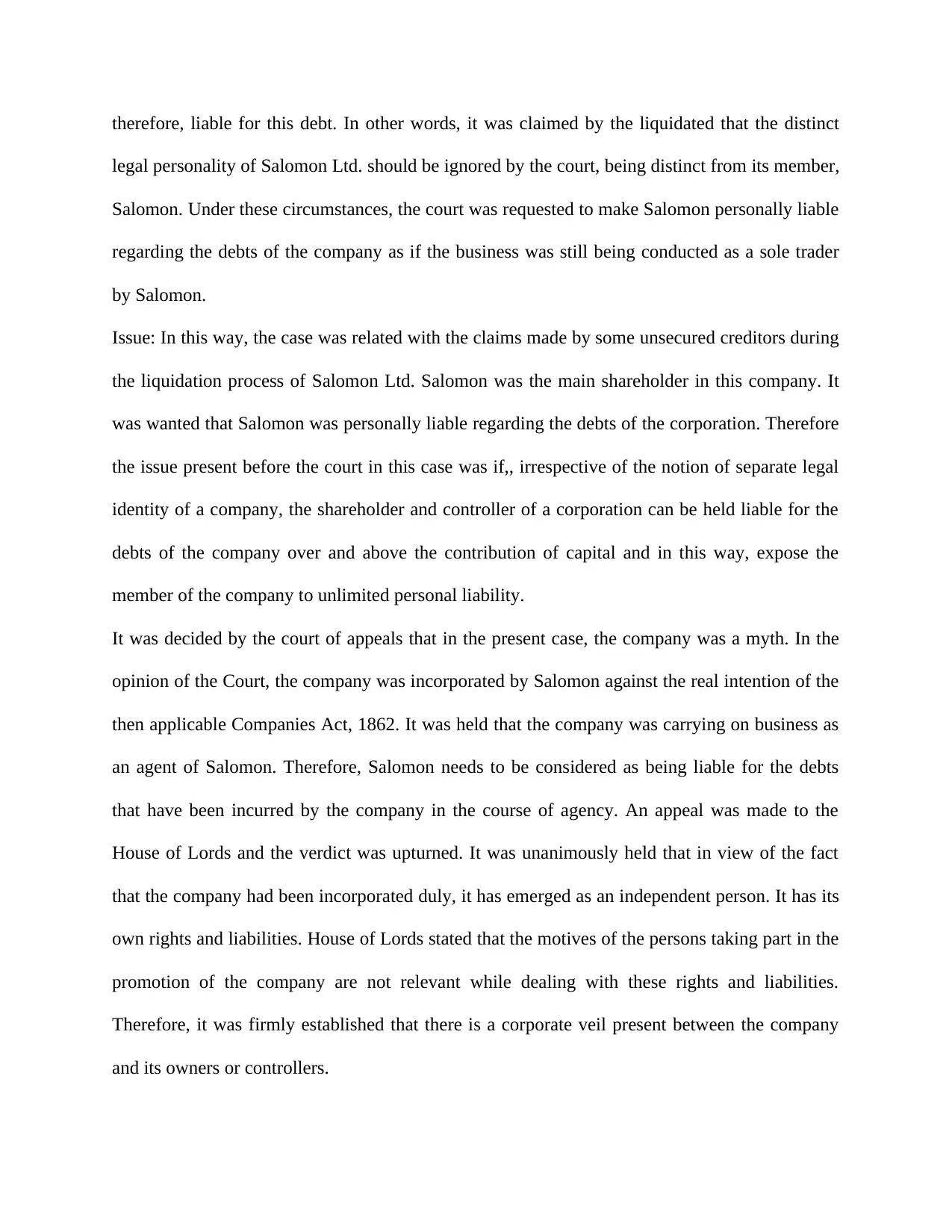
therefore, liable for this debt. In other words, it was claimed by the liquidated that the distinct
legal personality of Salomon Ltd. should be ignored by the court, being distinct from its member,
Salomon. Under these circumstances, the court was requested to make Salomon personally liable
regarding the debts of the company as if the business was still being conducted as a sole trader
by Salomon.
Issue: In this way, the case was related with the claims made by some unsecured creditors during
the liquidation process of Salomon Ltd. Salomon was the main shareholder in this company. It
was wanted that Salomon was personally liable regarding the debts of the corporation. Therefore
the issue present before the court in this case was if,, irrespective of the notion of separate legal
identity of a company, the shareholder and controller of a corporation can be held liable for the
debts of the company over and above the contribution of capital and in this way, expose the
member of the company to unlimited personal liability.
It was decided by the court of appeals that in the present case, the company was a myth. In the
opinion of the Court, the company was incorporated by Salomon against the real intention of the
then applicable Companies Act, 1862. It was held that the company was carrying on business as
an agent of Salomon. Therefore, Salomon needs to be considered as being liable for the debts
that have been incurred by the company in the course of agency. An appeal was made to the
House of Lords and the verdict was upturned. It was unanimously held that in view of the fact
that the company had been incorporated duly, it has emerged as an independent person. It has its
own rights and liabilities. House of Lords stated that the motives of the persons taking part in the
promotion of the company are not relevant while dealing with these rights and liabilities.
Therefore, it was firmly established that there is a corporate veil present between the company
and its owners or controllers.
legal personality of Salomon Ltd. should be ignored by the court, being distinct from its member,
Salomon. Under these circumstances, the court was requested to make Salomon personally liable
regarding the debts of the company as if the business was still being conducted as a sole trader
by Salomon.
Issue: In this way, the case was related with the claims made by some unsecured creditors during
the liquidation process of Salomon Ltd. Salomon was the main shareholder in this company. It
was wanted that Salomon was personally liable regarding the debts of the corporation. Therefore
the issue present before the court in this case was if,, irrespective of the notion of separate legal
identity of a company, the shareholder and controller of a corporation can be held liable for the
debts of the company over and above the contribution of capital and in this way, expose the
member of the company to unlimited personal liability.
It was decided by the court of appeals that in the present case, the company was a myth. In the
opinion of the Court, the company was incorporated by Salomon against the real intention of the
then applicable Companies Act, 1862. It was held that the company was carrying on business as
an agent of Salomon. Therefore, Salomon needs to be considered as being liable for the debts
that have been incurred by the company in the course of agency. An appeal was made to the
House of Lords and the verdict was upturned. It was unanimously held that in view of the fact
that the company had been incorporated duly, it has emerged as an independent person. It has its
own rights and liabilities. House of Lords stated that the motives of the persons taking part in the
promotion of the company are not relevant while dealing with these rights and liabilities.
Therefore, it was firmly established that there is a corporate veil present between the company
and its owners or controllers.
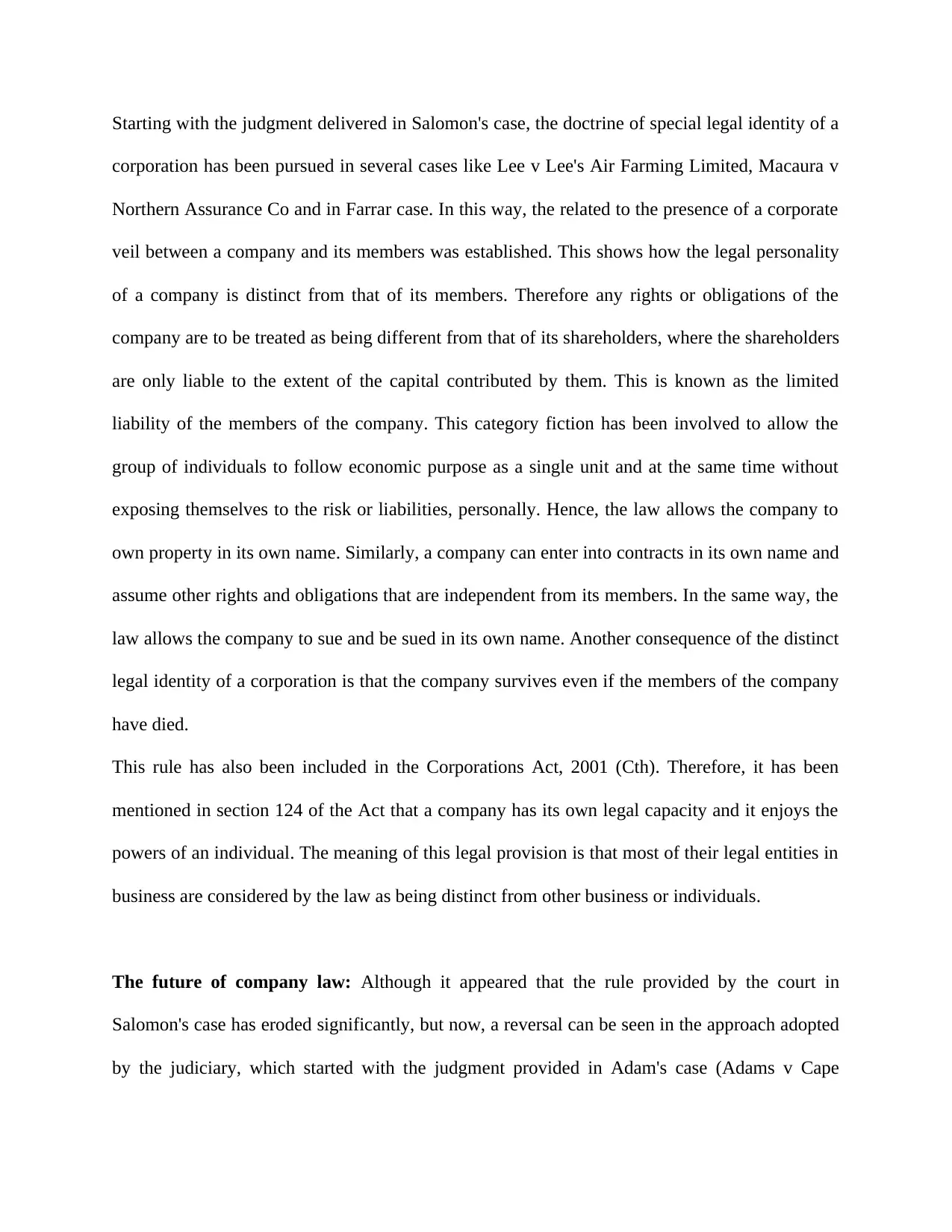
Starting with the judgment delivered in Salomon's case, the doctrine of special legal identity of a
corporation has been pursued in several cases like Lee v Lee's Air Farming Limited, Macaura v
Northern Assurance Co and in Farrar case. In this way, the related to the presence of a corporate
veil between a company and its members was established. This shows how the legal personality
of a company is distinct from that of its members. Therefore any rights or obligations of the
company are to be treated as being different from that of its shareholders, where the shareholders
are only liable to the extent of the capital contributed by them. This is known as the limited
liability of the members of the company. This category fiction has been involved to allow the
group of individuals to follow economic purpose as a single unit and at the same time without
exposing themselves to the risk or liabilities, personally. Hence, the law allows the company to
own property in its own name. Similarly, a company can enter into contracts in its own name and
assume other rights and obligations that are independent from its members. In the same way, the
law allows the company to sue and be sued in its own name. Another consequence of the distinct
legal identity of a corporation is that the company survives even if the members of the company
have died.
This rule has also been included in the Corporations Act, 2001 (Cth). Therefore, it has been
mentioned in section 124 of the Act that a company has its own legal capacity and it enjoys the
powers of an individual. The meaning of this legal provision is that most of their legal entities in
business are considered by the law as being distinct from other business or individuals.
The future of company law: Although it appeared that the rule provided by the court in
Salomon's case has eroded significantly, but now, a reversal can be seen in the approach adopted
by the judiciary, which started with the judgment provided in Adam's case (Adams v Cape
corporation has been pursued in several cases like Lee v Lee's Air Farming Limited, Macaura v
Northern Assurance Co and in Farrar case. In this way, the related to the presence of a corporate
veil between a company and its members was established. This shows how the legal personality
of a company is distinct from that of its members. Therefore any rights or obligations of the
company are to be treated as being different from that of its shareholders, where the shareholders
are only liable to the extent of the capital contributed by them. This is known as the limited
liability of the members of the company. This category fiction has been involved to allow the
group of individuals to follow economic purpose as a single unit and at the same time without
exposing themselves to the risk or liabilities, personally. Hence, the law allows the company to
own property in its own name. Similarly, a company can enter into contracts in its own name and
assume other rights and obligations that are independent from its members. In the same way, the
law allows the company to sue and be sued in its own name. Another consequence of the distinct
legal identity of a corporation is that the company survives even if the members of the company
have died.
This rule has also been included in the Corporations Act, 2001 (Cth). Therefore, it has been
mentioned in section 124 of the Act that a company has its own legal capacity and it enjoys the
powers of an individual. The meaning of this legal provision is that most of their legal entities in
business are considered by the law as being distinct from other business or individuals.
The future of company law: Although it appeared that the rule provided by the court in
Salomon's case has eroded significantly, but now, a reversal can be seen in the approach adopted
by the judiciary, which started with the judgment provided in Adam's case (Adams v Cape
⊘ This is a preview!⊘
Do you want full access?
Subscribe today to unlock all pages.

Trusted by 1+ million students worldwide
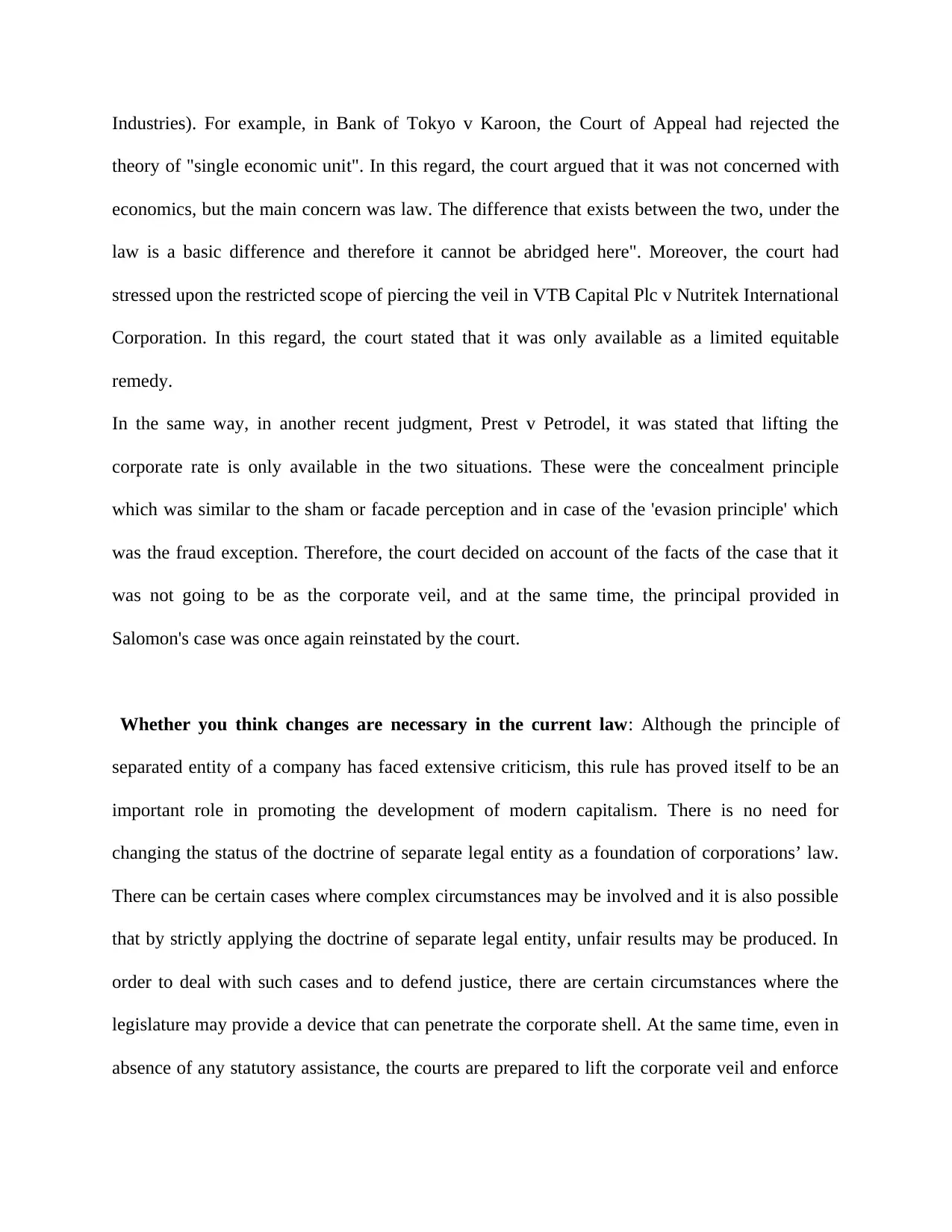
Industries). For example, in Bank of Tokyo v Karoon, the Court of Appeal had rejected the
theory of "single economic unit". In this regard, the court argued that it was not concerned with
economics, but the main concern was law. The difference that exists between the two, under the
law is a basic difference and therefore it cannot be abridged here". Moreover, the court had
stressed upon the restricted scope of piercing the veil in VTB Capital Plc v Nutritek International
Corporation. In this regard, the court stated that it was only available as a limited equitable
remedy.
In the same way, in another recent judgment, Prest v Petrodel, it was stated that lifting the
corporate rate is only available in the two situations. These were the concealment principle
which was similar to the sham or facade perception and in case of the 'evasion principle' which
was the fraud exception. Therefore, the court decided on account of the facts of the case that it
was not going to be as the corporate veil, and at the same time, the principal provided in
Salomon's case was once again reinstated by the court.
Whether you think changes are necessary in the current law: Although the principle of
separated entity of a company has faced extensive criticism, this rule has proved itself to be an
important role in promoting the development of modern capitalism. There is no need for
changing the status of the doctrine of separate legal entity as a foundation of corporations’ law.
There can be certain cases where complex circumstances may be involved and it is also possible
that by strictly applying the doctrine of separate legal entity, unfair results may be produced. In
order to deal with such cases and to defend justice, there are certain circumstances where the
legislature may provide a device that can penetrate the corporate shell. At the same time, even in
absence of any statutory assistance, the courts are prepared to lift the corporate veil and enforce
theory of "single economic unit". In this regard, the court argued that it was not concerned with
economics, but the main concern was law. The difference that exists between the two, under the
law is a basic difference and therefore it cannot be abridged here". Moreover, the court had
stressed upon the restricted scope of piercing the veil in VTB Capital Plc v Nutritek International
Corporation. In this regard, the court stated that it was only available as a limited equitable
remedy.
In the same way, in another recent judgment, Prest v Petrodel, it was stated that lifting the
corporate rate is only available in the two situations. These were the concealment principle
which was similar to the sham or facade perception and in case of the 'evasion principle' which
was the fraud exception. Therefore, the court decided on account of the facts of the case that it
was not going to be as the corporate veil, and at the same time, the principal provided in
Salomon's case was once again reinstated by the court.
Whether you think changes are necessary in the current law: Although the principle of
separated entity of a company has faced extensive criticism, this rule has proved itself to be an
important role in promoting the development of modern capitalism. There is no need for
changing the status of the doctrine of separate legal entity as a foundation of corporations’ law.
There can be certain cases where complex circumstances may be involved and it is also possible
that by strictly applying the doctrine of separate legal entity, unfair results may be produced. In
order to deal with such cases and to defend justice, there are certain circumstances where the
legislature may provide a device that can penetrate the corporate shell. At the same time, even in
absence of any statutory assistance, the courts are prepared to lift the corporate veil and enforce
Paraphrase This Document
Need a fresh take? Get an instant paraphrase of this document with our AI Paraphraser
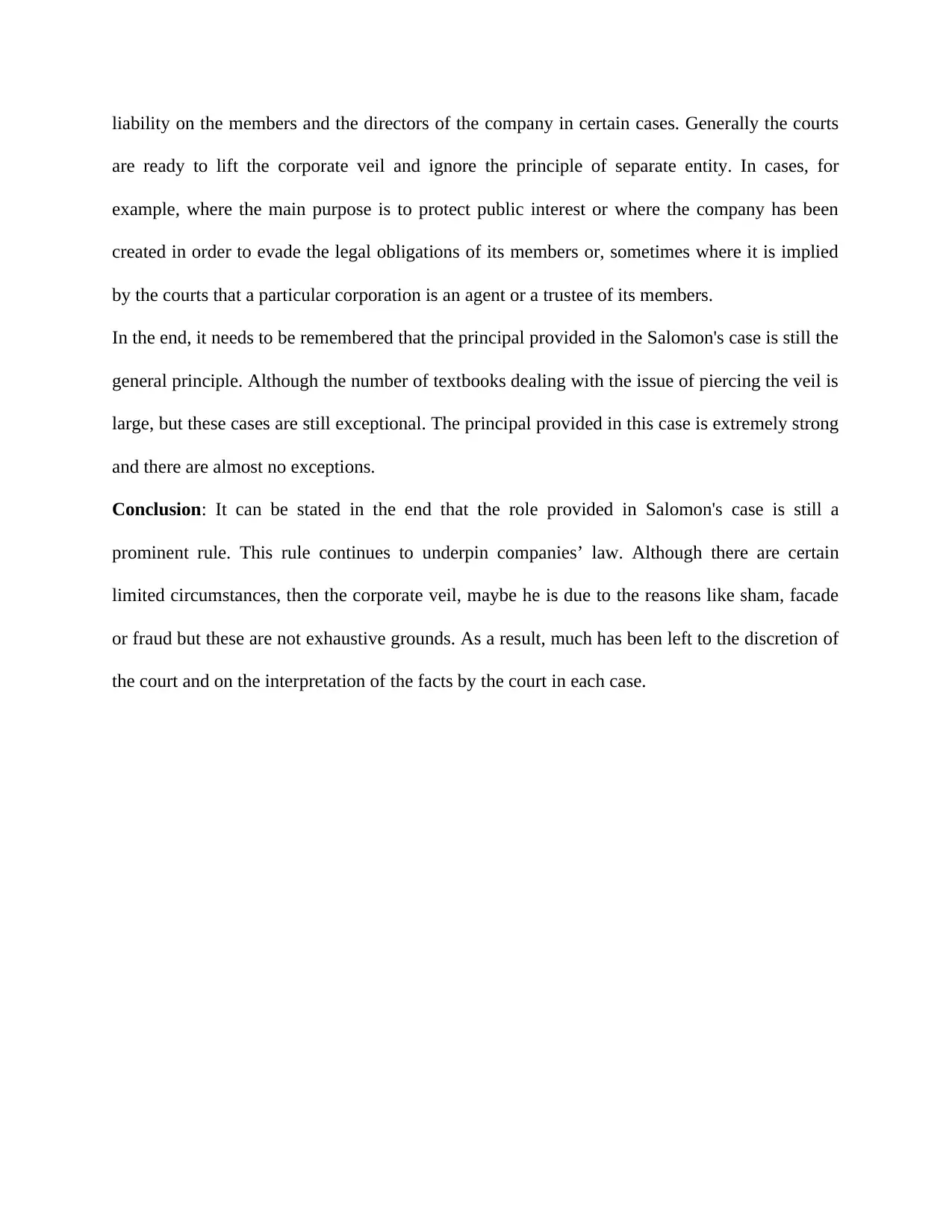
liability on the members and the directors of the company in certain cases. Generally the courts
are ready to lift the corporate veil and ignore the principle of separate entity. In cases, for
example, where the main purpose is to protect public interest or where the company has been
created in order to evade the legal obligations of its members or, sometimes where it is implied
by the courts that a particular corporation is an agent or a trustee of its members.
In the end, it needs to be remembered that the principal provided in the Salomon's case is still the
general principle. Although the number of textbooks dealing with the issue of piercing the veil is
large, but these cases are still exceptional. The principal provided in this case is extremely strong
and there are almost no exceptions.
Conclusion: It can be stated in the end that the role provided in Salomon's case is still a
prominent rule. This rule continues to underpin companies’ law. Although there are certain
limited circumstances, then the corporate veil, maybe he is due to the reasons like sham, facade
or fraud but these are not exhaustive grounds. As a result, much has been left to the discretion of
the court and on the interpretation of the facts by the court in each case.
are ready to lift the corporate veil and ignore the principle of separate entity. In cases, for
example, where the main purpose is to protect public interest or where the company has been
created in order to evade the legal obligations of its members or, sometimes where it is implied
by the courts that a particular corporation is an agent or a trustee of its members.
In the end, it needs to be remembered that the principal provided in the Salomon's case is still the
general principle. Although the number of textbooks dealing with the issue of piercing the veil is
large, but these cases are still exceptional. The principal provided in this case is extremely strong
and there are almost no exceptions.
Conclusion: It can be stated in the end that the role provided in Salomon's case is still a
prominent rule. This rule continues to underpin companies’ law. Although there are certain
limited circumstances, then the corporate veil, maybe he is due to the reasons like sham, facade
or fraud but these are not exhaustive grounds. As a result, much has been left to the discretion of
the court and on the interpretation of the facts by the court in each case.
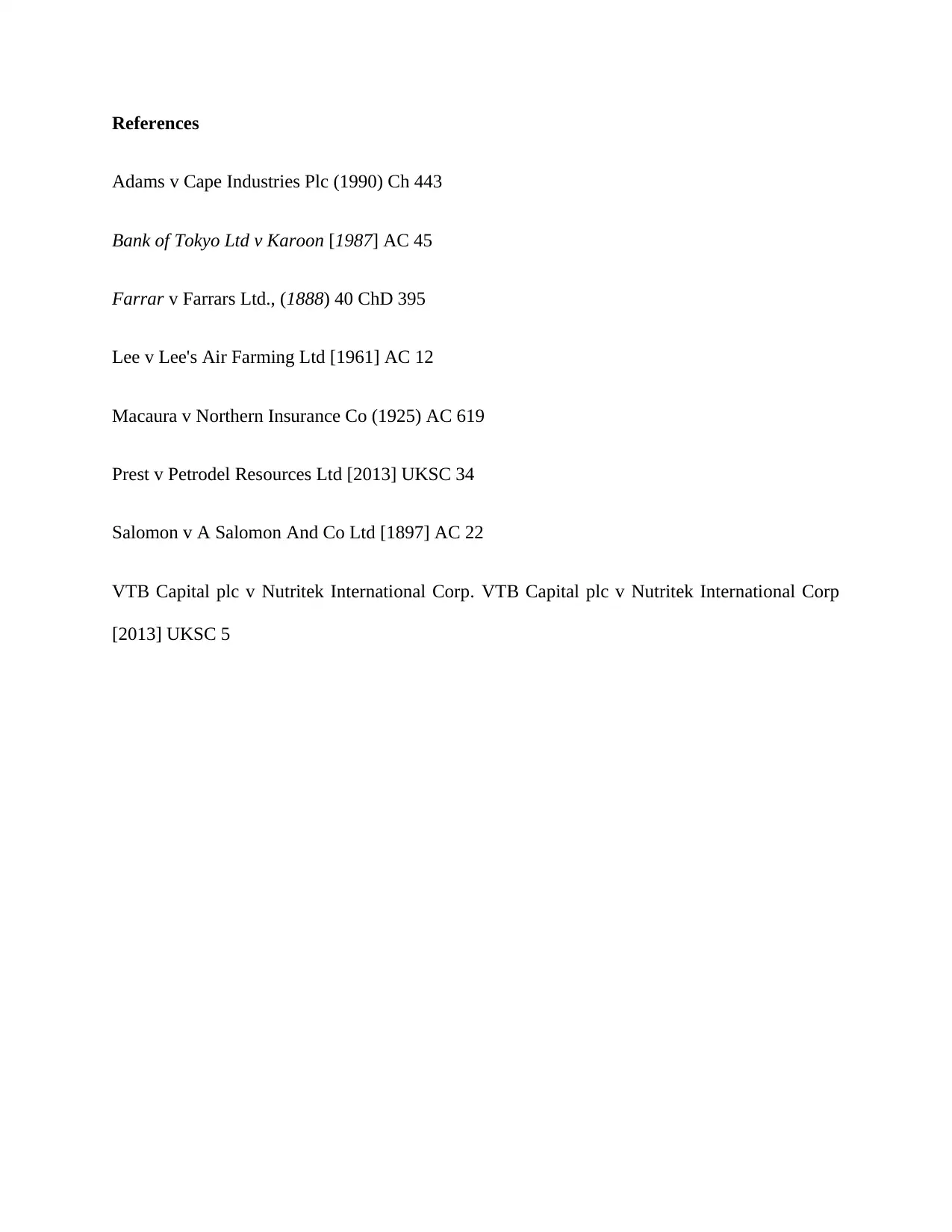
References
Adams v Cape Industries Plc (1990) Ch 443
Bank of Tokyo Ltd v Karoon [1987] AC 45
Farrar v Farrars Ltd., (1888) 40 ChD 395
Lee v Lee's Air Farming Ltd [1961] AC 12
Macaura v Northern Insurance Co (1925) AC 619
Prest v Petrodel Resources Ltd [2013] UKSC 34
Salomon v A Salomon And Co Ltd [1897] AC 22
VTB Capital plc v Nutritek International Corp. VTB Capital plc v Nutritek International Corp
[2013] UKSC 5
Adams v Cape Industries Plc (1990) Ch 443
Bank of Tokyo Ltd v Karoon [1987] AC 45
Farrar v Farrars Ltd., (1888) 40 ChD 395
Lee v Lee's Air Farming Ltd [1961] AC 12
Macaura v Northern Insurance Co (1925) AC 619
Prest v Petrodel Resources Ltd [2013] UKSC 34
Salomon v A Salomon And Co Ltd [1897] AC 22
VTB Capital plc v Nutritek International Corp. VTB Capital plc v Nutritek International Corp
[2013] UKSC 5
⊘ This is a preview!⊘
Do you want full access?
Subscribe today to unlock all pages.

Trusted by 1+ million students worldwide
1 out of 6
Related Documents
Your All-in-One AI-Powered Toolkit for Academic Success.
+13062052269
info@desklib.com
Available 24*7 on WhatsApp / Email
![[object Object]](/_next/static/media/star-bottom.7253800d.svg)
Unlock your academic potential
Copyright © 2020–2026 A2Z Services. All Rights Reserved. Developed and managed by ZUCOL.




